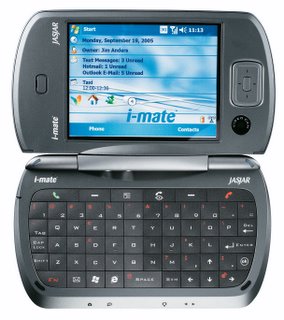
For almost a month I've been using (on loan) the
iMate JasJar as part of a story I'm doing for
Management Magazine.
In the brief 1500 words I'm given I don't have any space to mention what the product is like, so I'll post a review here because:
- It's relevant to just about anybody who wants to be more productive these days
- I can
- I might catch the eye of some editor who's looking for a great product reviewer, and/or
- I might catch the eye of some vendor who's looking for someone to shower their products upon!
One lives in hope.
I'll start with the only two gripes I have about the JasJar, because otherwise it is perfect. It's just a bit big to carry around all the time, and a bit bulky for the pocket - a kind of tough problem to overcome, because I wouldn't be fond of a smaller keyboard!
Second gripe is that it's designed for a right-handed person, so I actually block my own view when I scroll down, unless I suddenly become ambiguous. Sorry, ambidextrous!
But as I mentioned, it's near perfect in every other way. It combines a phone with a computer running Windows Mobile 5, which means if you're a Windows user (if you don't know, you probably are) you'll be in familiar territory.
It's amazing how many ways around you can have this beasty. The screen twists like a Tablet PC, which means you can have it like a laptop, or twist and fold the screen to be like a little notepad. Handwriting recognition's also surprisingly good, even when I do my doctor impression.
The big question is: how useful is it to me? Does it really add value? It certainly has in this past month as I've been working on three stories and trying to tee up others ... driving cars ... catching buses ... waiting in waiting rooms!
Being able to check email remotely was a godsend when I'm out of the office all day. It also helped to be able to look things up on the web, and use Word, Excel and even PDF files on the go. Only trouble with PDFs, though, is they're not that user friendly on the small screen. Nice touch, though!
An unusual side-effect of having the JasJar was increased popularity. You're automatically a more interesting person when you have a tiny computer, and inquiring minds want to know what it is you're doing...
I've got to admit, there were some times I just checked email because I could. And I suppose therein lies the danger of mobile technology - not within the technology itself, but in the people who use it.
So... at $1999 retail, would I actually go out and buy an iMate JasJar? I'm normally a very conservative technology buyer - it takes a lot for the benefits to outweigh the cost in my estimation. But after a month of being able to check emails on the run, being able to check IMDb right after seeing a movie, and working on the bus .... I'm really, really tempted.
Thanks to Vodafone and their PR agency Mango for the lend of the JasJar and also the Vodafone Mobile Connect Card. Much appreciated.



